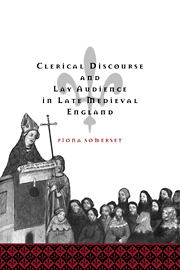Book contents
- Frontmatter
- Contents
- Acknowledgements
- PART I THE VERNACULAR OEUVRE
- 1 Introduction
- 2 ‘Lewed clergie’: vernacular authorization in Piers Plowman
- 3 The ‘publyschyng’ of ‘informacion’: John Trevisa, Sir Thomas Berkeley, and their project of ‘Englysch translacion’
- PART II CONTESTING VERNACULAR PUBLICATION
- Appendix
- Works cited
- Index
- CAMBRIDGE STUDIES IN MEDIEVAL LITERATURE
1 - Introduction
Published online by Cambridge University Press: 04 December 2009
- Frontmatter
- Contents
- Acknowledgements
- PART I THE VERNACULAR OEUVRE
- 1 Introduction
- 2 ‘Lewed clergie’: vernacular authorization in Piers Plowman
- 3 The ‘publyschyng’ of ‘informacion’: John Trevisa, Sir Thomas Berkeley, and their project of ‘Englysch translacion’
- PART II CONTESTING VERNACULAR PUBLICATION
- Appendix
- Works cited
- Index
- CAMBRIDGE STUDIES IN MEDIEVAL LITERATURE
Summary
…And so seculer power oweþ and is bounden to ponisshe by just peyne of his swerd, þat is, worldly power, try[u]auntis rebellinge a3ens God and trespassing a3ens man by what kyn trespas; and, þat is more, to chastise his sugetis by peyne or turment of here body. And no drede muche more he may ponisshe hem by takynge awey of here temporaltees, þat is lasse þan bodily peyne. Þerfore seculer lordis don þis ri3tfully, siþ þis is don by comaundement of þe apostoile and by ordinaunce of God. Þerfore it is pleyn of þes resouns and auctoritees; and seculer lordis may levefully and medefully, in mony causes, taken awey temporal godis 3oven to men of þe Chirche.
When Wyclif, and Wycliffites, appealed to the lay power to disendow the clergy, in one sense their strategy was nothing new. In the late fourteenth century it was not an innovation for argument couched in a high-intellectual idiom and propounded by the highly educated to tell power what it wanted to hear, and the practice has not fallen into disuse since. Around the time of Wyclif in late medieval England, however, this strategy takes on a particularly interesting form: for a short time, in between the beginnings of an extensive translation of Latin learning into the vernacular from the mid-fourteenth century onward and the growing legitimation of English as an ‘official’ written language of government and administration during the reign of Henry V, this strategy of argument requires what is temporarily a highly controversial sort of translation.
- Type
- Chapter
- Information
- Publisher: Cambridge University PressPrint publication year: 1998
- 1
- Cited by



